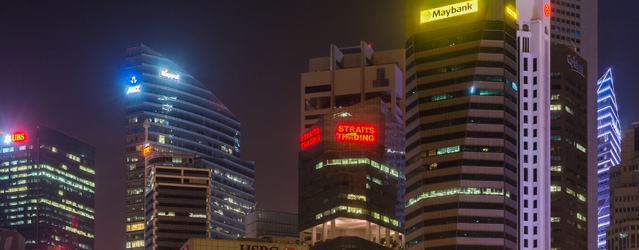At a time of turbulence and retrenchment, private banks increasingly seek success by narrowing their focus to design and deliver highly targeted wealth solutions.

Private banks promise safety and stability to the clients who entrust them with trillions of dollars, but no quantity of Italian marble and walnut paneling could shield the industry from the disruptions of the past few years. A business based on confidentiality, private banking continues to struggle with the glare of publicity since the Panama Papers laid bare the offshore arrangements of some of its biggest names. Its unhurried culture of personal attention is scrambling to adapt to the 24/7 digital age and provide always-on luxury with a contemporary image to the growing ranks of wealthy millennials and the emerging rich.
Asset growth has been hard to come by since early 2015, when world equity markets turned choppy after a steady six-year bull run and safe bond returns dwindled to near or below zero. An ascendant dollar has further eaten into portfolios in private banking’s European heartland. Eight of the global top 10 saw assets under management shrink in dollar terms for 2015, a trend that has likely continued this year. Without easy top-line gains, pressure grows to increase staff productivity and do more with less.
Some banks are winning by going where the new money is—like Silicon Valley, where BNY Mellon bought burgeoning wealth-management boutique Atherton Lane Advisers, or Southeast Asia, where industry retrenchment is lively. Singapore-based DBS Private Banking has been on an acquisitions spree, and earned top marks in Asia-Pacific (four awards overall), cementing its position as a rising challenger to the Western global giants. Others are providing traditional safe havens for client wealth threatened by erratic government—like Santander, whose award-winning Latin American operation draws heavily on Venezuela and Argentina—or laying bridges from an emerging region to the wider financial world, like Standard Bank, our top pick in Africa.The world’s best private banks, as determined by Global Finance, are finding ways to meet these challenges and recast their businesses for the future. Global champion UBS has delved deep into interactive technology to modernize a venerable brand. Citi Private Bank, winner in the Most Innovative category, took a leap toward transparency by asking clients of its Swiss branch to waive traditional banking secrecy.
There is more than one way to react to changing circumstances. Santander is trying to bring private banking to the mass affluent in the UK by lowering its minimum, while US powerhouses J.P. Morgan and Citi take the opposite tack: raising their antes to $10 million and $25 million, respectively. Not to react to changing conditions is to risk obsolescence. These awards show there are plenty of private banks moving toward the future without sacrificing the past.
|
GLOBAL WINNERS |
|
|
Best Private Bank in the World |
UBS |
|
Best Boutique Private Bank in the World |
Banque SYZ |
|
Most Innovative Private Bank in the World |
Citi Private Bank |
|
Best Private Bank for Impact Investing |
UOB |
|
Best Private Bank for |
BNY Mellon Wealth Management |
|
Best Private Bank in Emerging Markets |
Itaú Private Bank |
|
Best Private Bank for Entrepreneurs |
Northern Trust |
|
Best Private Bank for C-Suite Executives |
Morgan Stanley |
|
Best Private Bank for Millennials |
DBS Private Banking |
|
Best Private Bank for Net Worth <$1 million |
Santander Private Banking |
|
Best Private Bank for |
DBS Private Banking |
|
Best Private Bank |
J.P. Morgan Private Banking |
|
Bets Private Bank for Intergenerational Wealth Management |
The Pictet Group |
|
Best Private Bank in Digital Client Solutions |
KEB Hana Bank |
|
Industry Thought Leader |
Joan Crain, Senior Director, Global Family Wealth Strategist, BNY Mellon Wealth Management |
|
REGIONAL WINNERS |
|
|
Best Private Bank in North America |
J.P. Morgan Private Banking |
|
Best Private Bank for Entrepreneurs |
BMO |
|
Best Private Bank in Western Europe |
BNP Paribas |
|
Best Private Bank for Entrepreneurs |
Societe Generale Private Banking |
|
Best Private Bank in Asia-Pacific |
DBS Private Banking |
|
Best Private Bank for Entrepreneurs |
Bank of Singapore |
|
Best Private Bank |
UniCredit |
|
Best Private Bank in Latin America |
Santander Private Banking |
|
Best Private Bank in The Caribbean |
Scotia Wealth Management |
|
Best Private Bank in The Middle East |
Emirates NBD Private Banking |
|
Best Private Bank in Africa |
Standard Bank |
|
COUNTRY WINNERS |
|
|
Andorra |
Andbank |
|
Australia |
Westpac Private Bank |
|
Austria |
Schoellerbank |
|
Bahamas |
Scotia Wealth Management |
|
Bahrain |
Ahli United Bank |
|
Barbados |
CIBC FirstCaribbean |
|
Belgium |
Bank Degroof |
|
Bermuda |
Butterfield Bank |
|
Brazil |
Itaú Private Bank |
|
British Virgin Islands |
HSBC |
|
Canada |
Royal Bank of Canada |
|
Cayman Islands |
Butterfield Bank |
|
Chile |
Banchile Inversion |
|
China |
China Merchants Bank |
|
Colombia |
Bancolombia |
|
Croatia |
Raiffeisen Bank |
|
Cyprus |
Bank of Cyprus |
|
Czech Republic |
SOB |
|
Denmark |
Jyske Bank |
|
Egypt |
CIB |
|
Finland |
Nordea |
|
France |
Societe Generale Private Banking |
|
Georgia |
TBC Bank |
|
Germany |
Berenberg |
|
Greece |
Eurobank Ergasias |
|
Hong Kong |
Hang Seng Bank |
|
Hungary |
UniCredit |
|
India |
IIFL Wealth & Asset Management |
|
Ireland |
AIB |
|
Israel |
Bank Leumi |
|
Italy |
Intesa Sanpaolo |
|
Japan |
Credit Suisse |
|
Jordan |
Housing Bank for Trade & Finance |
|
Kenya |
Standard Bank |
|
Kuwait |
NBK Capital |
|
Lebanon |
Audi Private Bank |
|
Liechtenstein |
LGT Bank |
|
Luxembourg |
Banque de Luxembourg |
|
Malaysia |
Maybank Private Banking |
|
Mauritius |
Bank One |
|
Mexico |
Citi Private Bank |
|
Monaco |
Societe Generale Private Banking |
|
Netherlands |
ABN AMRO MeesPierson |
|
New Zealand |
ANZ Group |
|
Nigeria |
First Bank of Nigeria |
|
Norway |
Nordea |
|
Oman |
BankMuscat Private Banking |
|
Philippines |
BDO Private Bank |
|
Poland |
Bank Pekao Private Banking |
|
Portugal |
Banco Santander Totta |
|
Qatar |
al khaliji |
|
Romania |
Raiffeisen Bank |
|
Russia |
Sberbank Private Banking |
|
Saudi Arabia |
SABB |
|
Singapore |
DBS Private Banking |
|
Slovakia |
Tatra banka |
|
South Africa |
Standard Bank |
|
South Korea |
KB Kookmin Bank |
|
Spain |
BBVA |
|
Sweden |
Swedbank |
|
Switzerland |
Julius Baer |
|
Taiwan |
Taipei Fubon Bank |
|
Thailand |
Siam Commercial Bank |
|
Turkey |
Yapi Kredi Bank |
|
UAE |
Emirates NBD |
|
United Kingdom |
Barclays |
|
United States |
Northern Trust |

GLOBAL WINNERS
World’s Best Private Bank
UBS
The biggest private bank is showing its agility in tough times. UBS slashed SFr1.5 billion ($1.5 billion) in costs while investing in a digital facelift through its Zurich-based innovation lab. That stabilized income and profit this year, putting the bank in position to stay number one for some time to come, both globally and in the fast-growing Asia-Pacific region.
World’s Best Boutique Private Bank
Banque SYZ
While other Swiss banks adopt a defensive crouch in the face of US Justice Department suits and Panama Papers revelations, Banque SYZ has been on the move. Its 2015 acquisition of Royal Bank of Canada’s Swiss subsidiary doubled assets under management and extended its reach into the Western Hemisphere, including a new US branch this year. Founded in 1996 by Lombard Odier veteran Eric Syz, the bank has stormed the Swiss establishment by combining a modern outlook with traditional service and class.
World’s Most Innovative Private Bank
Citi
Citigroup is trying to turbocharge innovation across its businesses, creating Citi FinTech last year with techies poached from the likes of Amazon and PayPal. While Silicon Valley comes to the bank’s headquarters in Manhattan, Citi Private Bank is returning the favor by expanding its Bay Area presence. Citi is also innovating morally by asking clients of its Swiss operation to waive banking secrecy protections—and says it has not lost any business this way.
World’s Best Private Bank for Impact Investing
UOB
Socially responsible investing (SRI) is still an exotic notion in Asia, but Singapore-based UOB ranks as a pioneer. Its first SRI fund was launched in 2004, with co-investment from the Asian Development Bank. This year UOB Venture Management even joined forces with global rival Credit Suisse to launch an impact fund aimed at companies providing essential services to “bottom of the pyramid” communities. With UOB Private Bank’s steady asset growth, it should be able to spread the word to more of Asia’s emerging rich.
World’s Best Private Bank for New Customer Segments
BNY Mellon
With most private banks’ average customer in the 60-plus age bracket, the industry is looking hard for ways to reach the newly minted multimillionaires of Silicon Valley. Old-line BNY Mellon made a savvy move in that direction early this year, acquiring Atherton Lane Advisers, with its home office on legendary Sand Hill Road and a reported $2.7 billion under management.

World’s Best Private Bank in Emerging Markets
Itaú
During the past year, Itaú Private Bank experienced the definition of challenging conditions in its home market of Brazil, which has been gripped by recession, political upheaval and roller-coaster financial markets. Yet performance remained steady, with client assets growing 15% and net profit 17% (in local-currency terms) for the last reported year. Itaú’s Brazilian market share climbed by more than two percentage points, to 28%, while a new billion-dollar tech center and incubator accelerated digital penetration. A standout response to adverse circumstances.
World’s Best Private Bank for C-Suite Executives
Morgan Stanley
Although Morgan Stanley ranks in the Big Three of global wealth management, its deep ties to the US retail business allow it to offer a multitier suite of services—from a super-elite group with more than $20 million to invest, to mass affluent advisory in the sub-$1 million range. That makes it an ideal bank for working executives as they climb the compensation pyramid and wait for a big stock-options kill.
World’s Best Private Bank for Millennials
DBS
In Asia, where wealth is often familial, Singapore-based DBS is innovating to lock in its clients’ of-age children with a “next-generation” education program for those aged 18-25 and an aggressively tech-forward attitude. Dusty pamphlets have been purged from customer communications in favor of a proprietary iWealth app with 24/7 live chat and integrated research channel. By the time the millennials take charge, they will be loyal customers, DBS hopes.
World’s Best Private Bank for Net Worth Less Than $1 Million
Santander
The ambitious Spanish giant, already dominant in Latin American private banking, is playing for market share in the UK by offering private banking services with a threshold of £500,000 ($625,000). That’s an opposite tack to the one taken by some global leaders, who have been lifting minimums to concentrate on the ultrahigh-net-worth crowd, but it should earn Santander customers among the mass affluent.
World’s Best Private Bank for Net Worth $1 Million–$25 Million
DBS
Strong client acquisition in the middle market (by high-net-worth standards) helped the Singapore tiger grow assets under management by 6.5% in 2015—with a similar expansion projected for this year.
World’s Best Private Bank for Net Worth above $25 Million
J.P. Morgan
Focus on the super-rich is in vogue among US-based private banks, and J.P. Morgan looks to be outstripping Wall Street neighbors like Citi or Goldman Sachs in this pursuit. Jamie Dimon’s shop was one of only two global top-10 banks to grow assets under management in dollar terms for 2015. That was thanks, in large part, to 4.8% growth in Asia.
World’s Best Private Bank for Intergenerational Wealth Management
Pictet
Founded in Geneva in 1805, Pictet has long experience in dynastic wealth transitions. The bank’s own structure is maximally geared to stable and lasting relationships: an old-line partnership that eschews acquisitions in favor of organic growth and advertises staff retention when others are slashing headcount. A lifetime plan for managing entrepreneurial wealth prepares clients and their families well in advance for a smooth hand-off of the fortune.
World’s Best Private Bank for Digital Client Solutions
KEB Hana Bank
You would expect a fast-growing South Korean private bank to be tech-forward, but KEB Hana is pushing the envelope. A robo-adviser system, rolled out this year, spits out model portfolios for clients based on a short questionnaire, while the bank’s HEAD system (for Hana Early Analysis and Diagnostic) provides a unified risk score for those holdings in real time. The global industry could learn from this emerging-markets player.
World’s Best Private Bank for Entrepreneurs
Northern Trust
Northern Trust seeks to serve its core clients from the US business community across the full spectrum of their financial needs, offering loans for purchases such as homes or yachts alongside traditional wealth preservation. The Chicago-based bank was an early mover in Silicon Valley, putting 50 employees in place in San Francisco just in time for the latest wave of IPO cash-outs. One newly rich techie explained the appeal to Barron’s: “They’re a conservative Midwestern bank. I wanted the opposite of me.”

Industry Thought Leader
Joan Crain, BNY Mellon
Crain, a 25-year wealth-management veteran, is a prolific speaker and publisher in a typically reticent industry. A Canada native living in Florida, she focuses particularly on the swelling ranks of multinational families who might be subject to taxation in various jurisdictions. Her most memorable phrase: “accidental American”—non-US citizens who unknowingly incur US tax liabilities.
REGIONAL WINNERS
Best Private Bank in North America
JP Morgan
JP Morgan has been out ahead of a number of industry trends: focus on ultrahigh-net-worth individuals (it doubled its minimum for private banking to $10 million this year), aggressive cost-cutting (some 100 bankers got the ax in 2016, the first round of a planned $2 billion in reductions), and focus on Asia—where it holds the No. 9 position and is gaining fast on No. 8, Deutsche Bank Wealth Management. Quarterly results from 2016 indicate revenue is holding steady as staff costs decrease, which should mean a bump in profit.
Best Private Bank for Entrepreneurs in North America
BMO
While the bulge-bracket New York houses think global, BMO (formerly Bank of Montreal) is a true North American bank. It is tied by history to the burgeoning Canadian start-up hubs in Toronto and Vancouver, and by geography to the US heartland, running private banking from the Chicago headquarters of its partner, BMO Harris Bank. It adds up to a more accessible alternative for rising entrepreneurs, particularly those between America’s heavily banked coasts.
Best Private Bank in Europe
BNP Paribas
France’s largest bank moved aggressively into Asia early in this century, making an effective second home base for its private banking in Hong Kong. That bet has paid off generously in recent years: BNP showed a 9% increase in Asian assets under management for 2015, fueling a 6% advance globally (in euro terms). The powerhouse of Paris has also largely escaped negative attention from regulators and whistleblowers, a rarity among global leaders these days.
Best Private Bank in Europe for Entrepreneurs
Societe Generale
While French rival BNP has been doubling down on Asia, SocGen has been refocusing on Europe. It sold its Asian private banking business in 2014 to Singapore’s dynamic DBS, and this year agreed to acquire the venerable UK house Kleinwort Benson. Combined with the mother ship’s lending and trading capabilities, that gives the European entrepreneurial class an attractive option between bulge-bracket colossi and tony boutiques whose reach is more localized.
Best Private Bank in Asia-Pacific
DBS
Singapore-based DBS is the first home-grown Asian private bank to challenge global houses on its own turf, rising to sixth place in assets regionally in the latest league tables. Although it faces a tough challenge for the Chinese nouveau riche from mainland and Hong Kong competitors, it looks well positioned to grab market in nearby Indonesia, a tiger without China’s legal complexities and volatility.
Best Private Bank for Entrepreneurs in Asia-Pacific
Bank of Singapore
A hometown rival of DBS, Bank of Singapore drew basically even on size this year with its acquisition of Barclays’s Asian private banking operations. Aside from adding $18 billion in assets, the Barclays deal should open more doors for Bank of Singapore in Hong Kong, and, via Hong Kong, the entrepreneurial cauldron of China.
Best Private Bank in Central & Eastern Europe
UniCredit
Though based in Milan, UniCredit has spent 25 years building its network in ex-Communist Europe. That is paying off now with a rapid rise in Russian assets, as Vladimir Putin tightens the screws on local business, and a strong presence in Poland through subsidiary Pekao. UniCredit took over Schoellerbank, a sleepy old-line house in Austria, and transformed it into an offshore nexus for Eastern European money, with a 50% jump in regional assets for the latest reporting year.
Best Private Bank in Latin America
Santander
Spain-based Santander runs behind local private-banking leaders in Brazil and Mexico but boasts the most diversified strength across the Latin American region. It particularly shines at bringing needed services to countries like Venezuela and Argentina, where capricious governments are likely to make up their own financial rules in the name of serving the people.
Best Private Bank in the Caribbean
Scotia Wealth Management
Maybe it’s the weather, but Canadian private banks are particularly active in the Caribbean, and Toronto-based Scotiabank is the leader of the pack. Scotia opened its first Caribbean office in 1889 and has run wealth management there since the 1950s, with dual focus on the Cayman Islands and the Bahamas. The proven recipe seems still to work despite negative publicity around the tropical havens. Regional assets under management grew by 11% for the latest reporting year.
Best Private Bank in the Middle East
Emirates NBD
Emirates NBD has managed to keep growing its private banking operations despite two years of depressed oil prices’ biting into regional fortunes. Assets under management grew by 15% in its last reporting year, and profit inched up by 1.5%. That may be because the client base has become diverse geographically: The bank reports nearly half its clients come from outside the Middle East. Robust growth in South Asia particularly has helped offset tougher times for the traditional Gulf States customers.
Best Private Bank in Africa
Standard Bank
Based in South Africa, Standard’s private-banking arm is growing fastest in underbanked Nigeria and Kenya, with explosions of 41% and 71%, respectively, in assets under management. With budding operations in Ghana and Mauritius too, Standard is blazing the trail as a regional private bank for the fast-changing continent.



